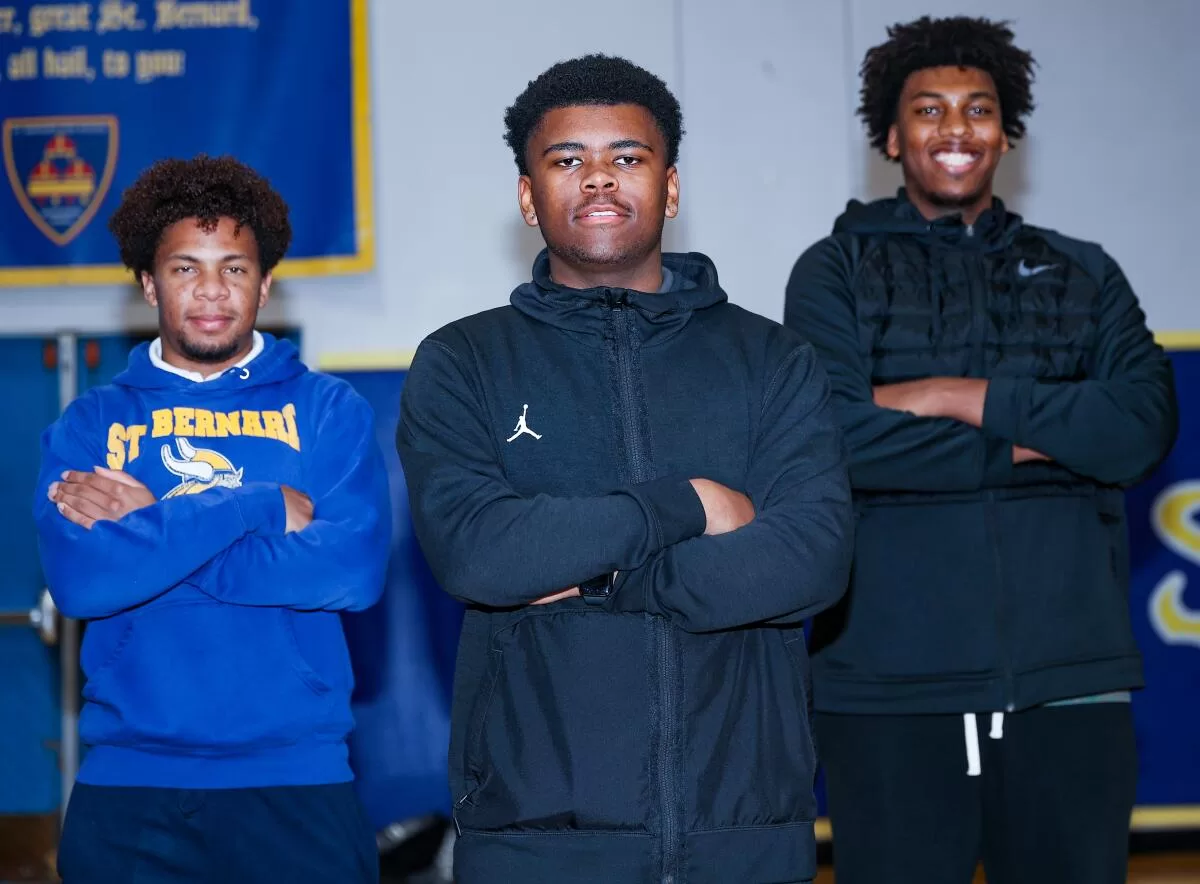He assured her, “I’m the guy.”
So began the rare experiment of letting a student coach a team in which there’s at least one student older than the coach.
“I felt he could handle it,” St. Bernard varsity coach Tony Bland said. “He was mature, had a high IQ. If this is something to spark a career interest, we have to do it.”
With two weeks left in the season, St. Bernard’s JV team is 12-2 and unbeaten in the Del Rey League. Bradford has convinced parents he knows what he’s doing and motivated players using the same strategy of the great John Wooden — come and sit next to me on the bench if you don’t follow instructions.
And he hasn’t picked up a single technical foul.
“Accountability. That’s what we preach,” said the straight-A student who has applied to USC, UCLA, California, Syracuse, San Diego State and Vanderbilt with the hope of majoring in communications.
“I’m just proud of the knowledge they have gained and the difference between October and now is drastic,” he said of his players. “They’re very attentive because they know if they’re not, they’ll be sitting next to me.”
It’s still a bit of a shock when opposing coaches or officials learn the JV coach is 17 . Yes, there’s an adult assistant coach, but Bradford runs the practices and makes the coaching decisions, all while he’s a full-time high school student. He even hired a good friend who used to play basketball with him, 17-year-old Marsalis Davis, to be an assistant.
Players call him Coach Bradford. Friends joke by calling him “Coach Tony,” comparing him to Bland.
“I love being able to give off my knowledge and spread it to those who want to go far,” Bradford said.
Bradford is part of the COVID-19 class of students who entered high school in 2020 and had their seasons disrupted by the pandemic. He played two years of basketball, reaching the JV level, then wanted to switch to football. But St. Bernard didn’t have a football team. He and Bland agreed last summer he could stay involved since there was no JV coach.
(Craig Weston)
“He’s been great,” Bland said. “They all love him. He’s really good at communication with parents and being transparent.”
Said Bradford: “The biggest thing is making sure there are consequences for wrong actions. I’m trying to teach discipline. If you get beat on plays, you’re coming out. Accountability is the big word. I have to hold myself accountable, my coaches accountable, my players accountable. Teachers have come to me if any players are misbehaving. I’ve asked teachers to come to me about grades. I’m coaching and game planning at night. I’m keeping my grades up, so can you.”
There’s no guarantee that Bradford will keep coaching. He’s enjoying the opportunity and appreciates adults giving him the responsibility to direct a group of teenagers. They’ve placed their trust in him and he’s delivered.
Asked for his biggest challenge, Bradford said, “Trying to get the guys to buy in. Being a 17-year-old, one of my players is older than me. I’m trying to earn my respect. It’s easier to buy in when you’re winning. Winning solves a lot of issues.”
Whatever the future holds, Bradford has a very impressive addition to his résumé that might impress a college admissions officer looking for students with ambition and unusual experiences.
Bland says his real job is helping students get to college and giving them opportunities to explore their dreams. It’s a good time to be a high school student. Schools are broadcasting games and letting students learn about cameras, video and doing play by play. They’re running scoreboards, serving as journalists, even coaching.
It’s great to see adults trusting teenagers to do adult things while staying in the background ready to provide support when needed. It’s a brilliant idea and should be embraced and duplicated when the right passionate teenager is found. Age should never limit someone from chasing their dream when they have the capability to fulfill the job.
